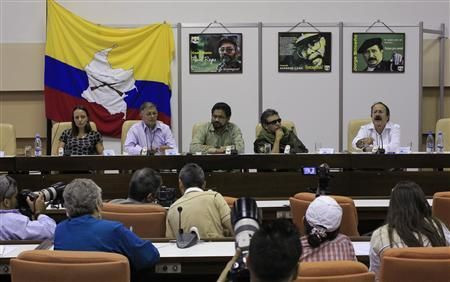
(Reuters) - Marxist rebels and the Colombian government adjourned their latest round of peace talks on Thursday with no major advances toward ending their long conflict and said they had significant differences to overcome despite some areas of agreement.
They said they agreed that the lives of the country's rural poor must be improved, which is the key issue in their 50-year-long war, but not on how to go about it.
"The conversations advance in a climate of respect and of broad dialogue," government lead negotiator Humberto de la Calle said after leaving Thursday's negotiations in Havana. "There are similarities in the desire to transform the countryside, although there remain notable differences."
The government and the FARC, or Revolutionary Armed Forces of Colombia, are in their third month of talks to end the conflict that has killed tens of thousands of people and displaced several million others over the decades.
The FARC is Latin America's longest-running leftist insurgency. A vestige of the Cold War, it was founded in 1964 as a communist agrarian movement to fight Colombia's long history of social inequality, particularly the concentration of most of the country's land in a few hands.
The government and the FARC both believe it is important for the rural poor to have land to work, but FARC lead negotiator Ivan Marquez said the rebels would like to get it from cattle ranchers.
He told a news conference that ranchers had 40 million hectares of land, or almost 100 million acres, half of which could be given to the poor.
BIG 'BALLOON' OF LAND
"From this big balloon of land, at least 20 million hectares (50 million acres) could be taken to give to the peasants, the displaced (and others)," Marquez said.
But the government has said it wants to give the poor the land that has been abandoned or taken over illegally by drug traffickers or other illicit groups. It says the right of private property must be protected.
"In this (negotiating) round, we have addressed in all aspects the issue of access to land, within the constitutional framework. That is to say that it will not weaken the guarantee, the right to property acquired legitimately," de la Calle said, reading from a prepared statement.
The two sides will reconvene on January 31 in the Havana convention center where the talks began on November 19.
After land reform and rural development, they have agreed to discuss other thorny topics, including the political future of the FARC and the legal future of its leaders, virtually all who have criminal charges hanging over them due to the group's history of kidnappings, extortion and illicit drug trafficking to finance its activities.
Colombian President Juan Manuel Santos initiated the talks betting that the FARC had been so weakened by a decade-long, U.S.-backed offensive that it was ready for peace.
But the FARC is said to have about 9,000 troops and can still inflict damage on the infrastructure of Latin America's fourth largest economy.
Santos, facing re-election next year, wants a peace agreement by November.
De la Calle has said the talks need to move more quickly, but one of the rebel leaders, Jesus Santrich, said he thought they were speeding along like a fast-paced Latin dance.
"In our opinion, it's a mambo rhythm, not a slow one. It goes fast," he said.
(Additional reporting by Nelson Acosta and Rosa Tania Valdes; Editing by Tom Brown and Peter Cooney)
© Thomson Reuters.




